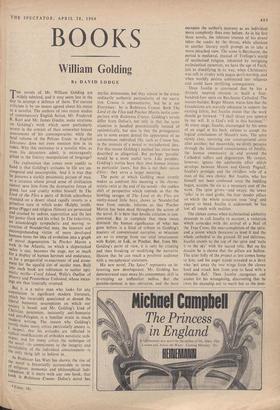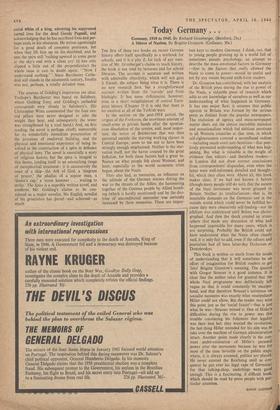BOOKS
William Golding
By DAVID LODGE
THE novels of Mr. William Golding are widely admired, and it may seem late in the day to attempt -a defence of them. Yet current criticism is by no means agreed about his status as a novelist. The authors of two recent studies of contemporary English fiction, Mr. Frederick R. Karl and Mr. James Gindin, make strictures on Golding's work which seem particularly severe in the context of their somewhat lenient assessments of his contemporaries; while the final volume of the Pelican Guide to English Literature does not even mention him in its index. Why this resistance to a novelist who, as even his detractors admit, is extravagantly gifted in the literary manipulation of language?
The explanation that comes most readily to hand is that Golding's attitudes to life are un- congenial and unacceptable. And it is true that be presents a starkly pessimistic picture of man, as a creature whose proud sense of civilisation cannot save him from the destructive forces of greed, lust and cruelty within himself. In The Lord of the Flies a party of British schoolboys stranded on a desert island rapidly reverts to a primitive state in which order (Ralph), intelli- gence (Piggy) and religion (Simon) are persecuted and crushed by sadism, superstition and the lust for power (Jack and his tribe). In The Inheritors, an astonishingly sympathetic and moving re- creation of Neanderthal man, the innocent and uncomprehending victim of more developed humans turns the idea of evolution into a graph of moral degeneration. In Pincher Martin a rock in the Atlantic, on which a shipwrecked sailor is cast, becomes the stage, not so much for a display of human heroism and endurance, as for a purgatorial re-enactment of and atone- ment for the squalid sins of secular man. Built into each book are references to earlier opti- mistic myths—Coral Island, Wells's Outline of History and Prometheus Unbound, whose mean- ings are thus ironically reversed.
But it is a naïve man who looks for any Consolation in significant modern literature, which has invariably questioned or denied the liberal humanist assumptions on which our societ.r. is based; and Mr. Golding's kind of Christian pessimism, insistently anti-humanist and anti-Pelagian, is a familiar strain in much modern writing. The reason why Golding's novels make many critics particularly uneasy is, i suspect, that his attitudes are reflected in radical modifications of orthodox novelistic tech- /Noe; and for many critics the technique of the novel--its commitment to the integrity and inviolability of the individual consciousness—is the only thing left to believe in.
As Professor Ian Watt has shown, the rise of the novel is historically accountable in terms of religious, economic and philosophical indi- If it starts with any one book, that book is Robinson Crusoe. Defoe's novel has *Faber, 18s. mythic dimensions, but they subsist in the extra- ordinarily authentic particularity of the narra- tive. Crusoe is representative, but he is not Everyman: he is Robinson Crusoe. Both The Lord of the Flies and Pincher Martin invite corn- parison with Robinson Crusoe. Golding's novels differ from Defoe's, not only in that the same situation is handled pessimistically instead of optimistically, but also in that the protagonists are to some extent denied the appearance of an autonomous individual life, such as Crusoc has, in the interests of a moral or metaphysical idea. For this reason Golding's method has often been described as allegorical. But perhaps 'parable' would be a more useful term. Like parables, Golding's stories have their own human interest as partiCular 'cases,' but this is not their raison d'etre: they serve a larger meaning.
The point at which Golding most overtly makes us confront this meaning is the charac- teristic twist at the end of his novels—the sudden shift of perspective which reminds us that the howling savages of The Lord of the Flies are snotty-nosed little boys, shows us Neanderthal man from outside, informs us that Pincher Martin has been dead throughout the action of the novel. It is here that hostile criticism is con- centrated. But to complain that these twists diminish' the human significance of what has gone before is a kind of tribute to Golding's mastery of conventional narrative, so reluctant are we to emerge from our total involvement with Ralph, or Lok, or Pincher, But, from Mr. Golding's point of view, it is only by creating and then breaking or modifying the narrative illusion that he can reach a positivist audience with a metaphysical statement.
His new novel, The Spire,* represents an in- teresting new development. Mr. Golding has demonstrated once more his consummate skill in re-creating an unfamiliar milieu. But The parable-element is less obtrusive, and [he hero occupies the author's interests as an individual more completely than ever before. As in his first three novels, the inherent interest of his donne takes' the reader by the throat, while allusions to another literary myth prompt us to take a more detached view. The scene is Barchester, the period is mediaeval. Instead of Trollope's world of secularised religion, inhabited by intriguing ecclesiastical careerists, we have the age of Faith, just as disedifying in its way, when Christianity was still in rivalry with pagan devil-worship, and when worldly desires sublimated into religious zeal could have terrifying consequences.
Dean Jocelin is convinced that he has a divinely inspired mission to build a four- hundred-foot spire on Barchester Cathedral. The master-builder, Roger Mason, warns him that the foundations are scarcely adequate to support the existing fabric, but Jocelin insists that' the work should go forward. ' "I shall thrust you upward by my will. It is God's will in this business."' At every stage, Jocelin, encouraged by his sense of an angel at his back, refuses to accept the logical conclusions of Matron's tests. The spire slowly rises, surviving one constructional crisis after another; but meanwhile, we dimly perceive through the infatuated consciousness of Jocelin, the human community in and around the Cathedral suffers and degenerates. He cannot, however, ignore the adulterous affair which develops between Mason and Goody Pagnall, Jocelin's protegde and the childless wife of a man of his own choice. But Jocelin, who has himself not been confessed since the building began, accepts the sin as a necessary cost of the work. The spire grows—and sways; the tower 'talks' in its steel girdle, the four slender pillars on which the whole structure rests 'sing' and appear to bend. Jocelin is undeterred; he has lost all touch with realities.
The climax comes when ecclesiastical authority descends to call Jocelin to account, a visitation which coincides with the arrival of a Nail of the True Cross, the near-completion of the spire, and a storm which threatens to level it and the whole cathedral to the ground. Ill and delirious, Jocelin crawls to the top of the spire and 'nails it to the sky' with the sacred relic. But on his descent he is shown that the pillars are hollow. The utter folly of the project at last comes home to him, and his angel stands revealed as a devil who 'put away the two wings from the cloven hoof and struck him from arse to head with a whitehot flail.' Then Jocelin recognises and atones for his wrongdoing, discovering that he owes his deanship not to merit but to the post- -
coital whim of a king, admitting his suppressed carnal love for the dead Goody Pagnall, and acknowledging that he has sacrificed lives and per- haps souls to his obsession. He strives agonisingly for a good death of complete penitence, but when they lift him up on his deathbed, and he sees the spire still 'rushing upward to some point at the sky's end with a silent cry' (it has only slipped a little out of the perpendicular) the whole issue is cast in doubt again. "Now I understand nothing."' Since Barchester Cathe- dral still stands in the nineteenth century, Jocelin was not, perhaps, a totally deluded man.
The sources of Golding's inspiration are clear. Trollope's Barchester was based on Salisbury, where Golding lives; and Golding's cathedral corresponds very closely to Salisbury's. (Sir Christopher Wren commented that the four cen- tral pillars were never designed to take the weight they bear, and subsequently the tower was strengthened by a steel band.) And, on first reading, the novel is perhaps chiefly memorable for its wonderfully immediate presentation of the processes of mediaeval building, and the physical and emotional experience of being in- volved in the construction of a spire in defiance of physical laws. The novel is essentially a story of religious hubris; but the spire is integral to this theme, lending itself to an astonishing range of metaphorical treatment: it is successively the mast of a ship—the Ark of God, a 'diagram of prayer,' the phallus of a supine man, a 'dunce's cap,' a 'stone hammer . . . waiting to strike.' The Spire is a superbly written novel, and confirms Mr. Golding's claims to be con- sidered as a major novelist. No English novelist of his generation has Oared—and achieved—as much.







































 Previous page
Previous page